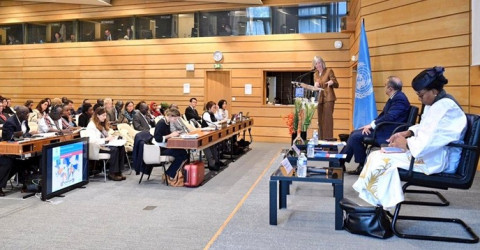
GCED Basic Search Form
Quick Search
You are here
News

“Literacy is the starting point for any form of quality inclusive education and we need to support and scale up the many initiatives across the globe seeking to make literacy a reality for all,” said UNESCO Director-General Audrey Azoulay in her message for International Literacy Day.
UNESCO held its International Literacy Day conference in Paris on Monday 9 September, bringing together stakeholders and decision-makers from all over the world.
Under the theme of ‘literacy and multilingualism’, participants discussed key issues and ways to improve literacy policies and practices in multilingual contexts in our increasingly globalized, digital world.
This was also an opportunity to express solidarity with the celebrations of the 2019 International Year of Indigenous Languages(link is external) and the 25th anniversary of the World Conference on Special Needs Education, at which the Salamanca Statement on Inclusive Education was adopted.
At the opening session of the conference, UNESCO Assistant Director-General for Education, Ms Stefania Giannini said:
“The relationship between globalization, digitalization and languages is paradoxical. On the one hand, with human mobility on the rise, people are increasingly exposed to multiple languages and use more than one language in life, work and learning. The reality today is that about two in three children grow up in multilingual contexts. But globalization is also threatening diversity, acting as a powerful force towards uniformity. It is this trend that we must counter for multilingualism to flourish, through concrete policies – within and beyond the education sector.”
Ms Koumbou Boly Barry, UN Special Rapporteur on the Right to Education, Office of the United Nations High Commissioner for Human Rights (OHCHR) stressed in her opening speech the importance of rights-based approaches to unleash the transformative potential of literacy.
She referred to the need for benchmarking the use of mother language and policies that underpin a holistic vision that encompasses quality formal and non-formal education.
Background for this year’s theme
Our world is linguistically rich with around 7,000 languages spoken, each linked to distinct identities, cultures and knowledge systems. Due to globalization, digitalisation and increasing mobility, today, multilingualism has expanded even further, with many people using more than one language in their everyday lives.
Evidence, however, shows that only some of these languages are promoted: a mere 5 percent of the world’s languages are present on the Internet, 2680 spoken languages are in danger of disappearing, and 40 percent of the world’s population lack access to education in the language they speak or understand, affecting the quality of education and learning throughout life. These challenges put at risk the quality of people’s lives as well as linguistic and cultural diversity.
On the occasion of ILD 2019, UNESCO called for rethinking literacy in multilingual contexts as an essential element in addressing the global literacy challenges and encouraged the International Community to invest in inclusive literacy policies and practices that reflect the needs and environments of learners, to foster more linguistic diversity and inclusivity in education.
During the Conference, a ceremony was also held to appreciate decade-long collaboration of HRH Princess Laurentien of the Netherlands with UNESCO as the Special Envoy on Literacy for Development:
“Over the past ten years, you have never ceased to raise the flag around literacy as a right, as a confidence builder, as a transformational force for individuals and families,” said Ms Giannini.
In her keynote speech, HRH Princess reaffirmed her commitment to UNESCO’s work to improve literacy, and by saying that “literacy start in the womb”, she highlighted the importance of investing in language development in the earliest years of a child’s life as an effective preventive measure, and enhancing the quality of education by involving children in co-creating education programmes.
The conference culminated in a Prize Award Ceremony, recognizing this year’s winning projects from Algeria, Colombia, Indonesia, Italy and Senegal, through five 2019 UNESCO International Literacy Prizes.
Expressing her deepest gratitude to each of the five winners for their firm commitment, inspiring innovation, and bold action, Ms Giannini of UNESCO said:
“I hope that your programmes and initiatives we reward today will create a positive chain of action to make our world more literate and inclusive, blessed by diversity.”
URL:
https://en.unesco.org/news/multilingualism-focus-unesco-international-literacy-day-conference
